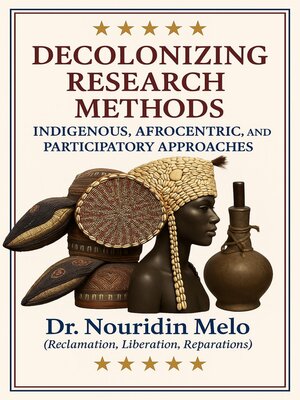Decolonizing Research Methods
ebook ∣ Indigenous, Afrocentric, and Participatory Approaches
By Dr. nouridin melo

Sign up to save your library
With an OverDrive account, you can save your favorite libraries for at-a-glance information about availability. Find out more about OverDrive accounts.
Find this title in Libby, the library reading app by OverDrive.



Search for a digital library with this title
Title found at these libraries:
| Library Name | Distance |
|---|---|
| Loading... |
Description for Decolonizing Research Methods: Indigenous, Afrocentric, and Participatory Approaches
Decolonizing Research Methods: Indigenous, Afrocentric, and Participatory Approaches by Dr. Nouridin Melo is a groundbreaking guide that dismantles colonial legacies in academia while centering marginalized epistemologies. This urgent work challenges Western research paradigms that perpetuate epistemic violence, offering instead ethical, relational frameworks rooted in Indigenous wisdom, Afrocentric philosophy, and grassroots activism.
Key Features:
Dr. Melo, an economist and political analyst, merges rigorous scholarship with lived experience, advocating for research as a liberatory practice. Whether dismantling algorithmic bias or revitalizing Indigenous languages, this book is a compass for those committed to justice, equity, and epistemological diversity.
Ideal For:
A manifesto and manual in one, this book is essential reading for anyone ready to unlearn colonial habits and co-create knowledge that heals, empowers, and transforms.







